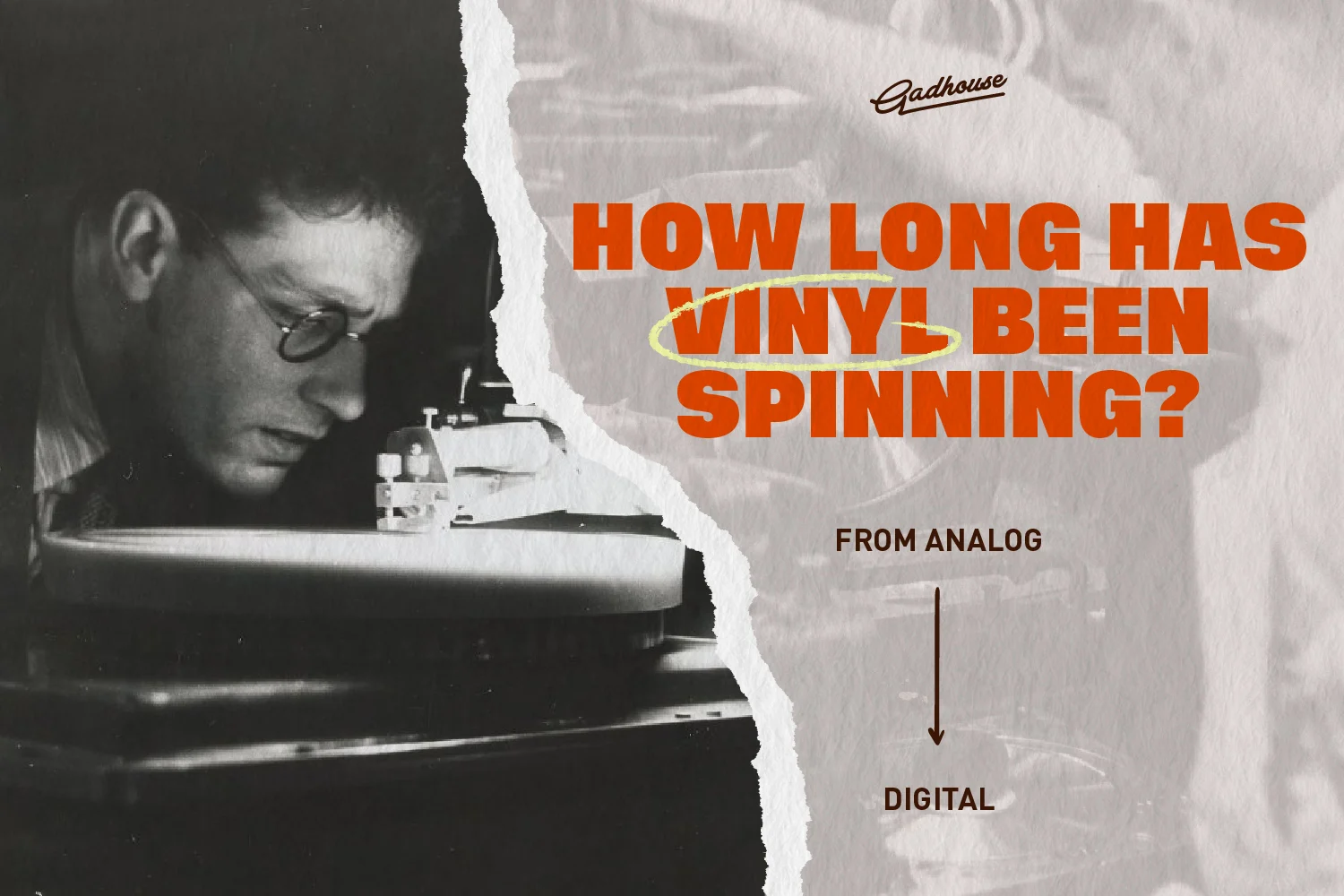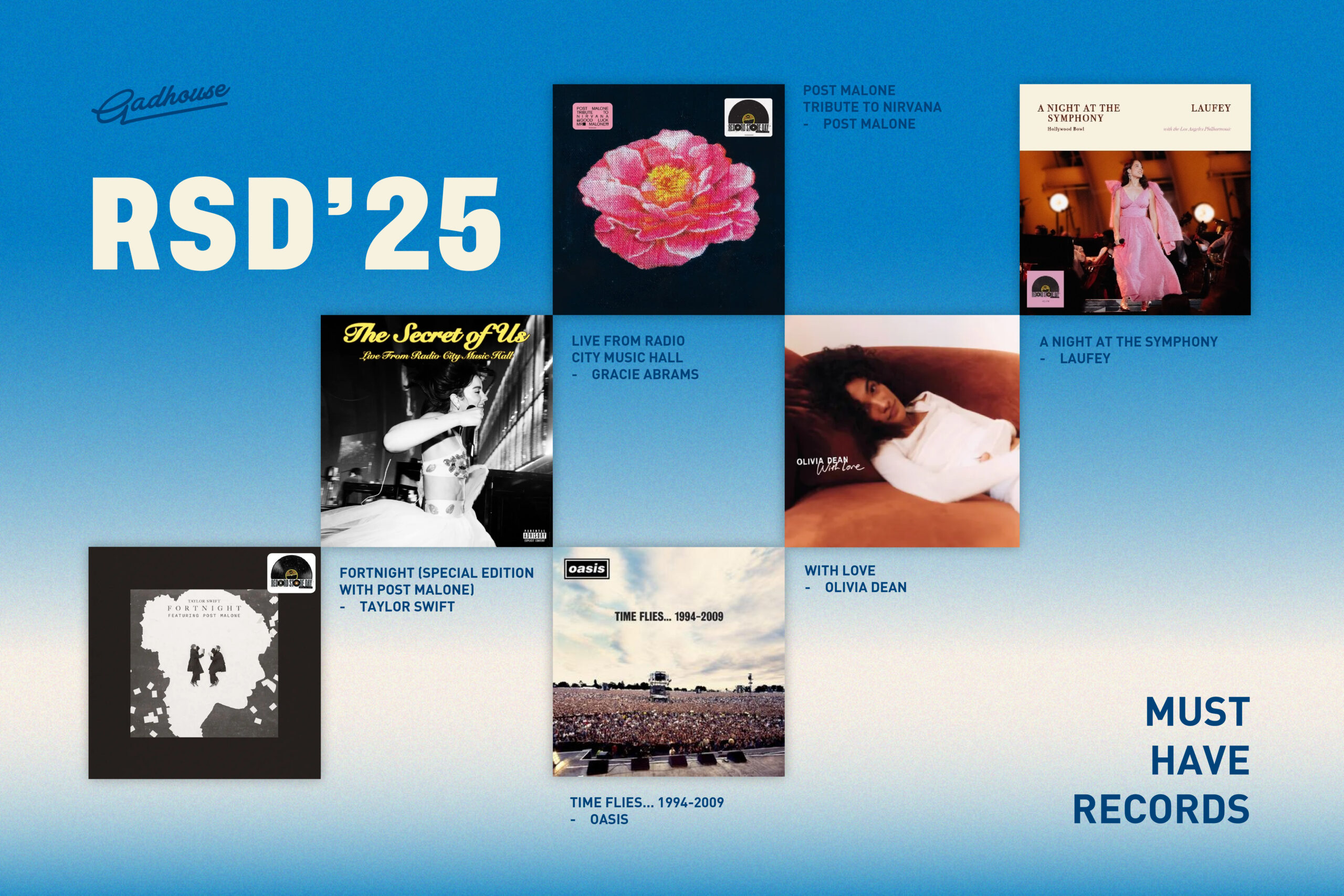
How Long Has Vinyl Been Spinning? | Gadhouse
Discover the history of vinyl records and turntables, from Edison’s phonograph to today’s vinyl revival. Plus, discover hidden stories and

This edition of WHYNYL? sees Gadhouse joining Thai-Dutch duo ‘Apichat Pakwan’ to discuss their appreciation for Asian folk music, touring as a Molam-Dub hybrid act, and the trials and tribulations of being an artist during the pandemic.
God forbid the first person ever to mix genres.
Society is spoiled by the concept of genres. We used to be in control of how each genre represents a certain type of music. Now it’s more like the genres themselves are in control of us–how we should feel and what we must associate it with, etc. to the point where, in many places around the world, the genre itself is an integral part of the culture. So it’s understandable that blending genres together can feel like a big no-no. Like mixing different oils and water, so to speak.
However, on rare occasions when such musical emulsions come to exist, the results can be euphoric. When done with care and respect, such Franken-genres allow contrasting genres to bleed into each other and produce the most captivating, most interesting pieces of music you’ll ever hear.
In this edition of WHYNYL?, we would like to introduce you to Apichat Pakwan–DJ duo, producers and musical alchemists who have been blending electronic and dub into Molam, Thai northeastern folk music since 2016 with their first 10”. Years of touring and a pandemic later, we met up with the duo at Wualai Records, Changmai to talk about their musical journey from humble beginnings to major world stages, as well as the trials and tribulations of making music the COVID-19 pandemic that only made them stronger.
Now sit back and relax as we bring you into the world of Apichat Pakwan where lines blur and cultures collide.

Introducing Olivier Shreuder and Angkanang Pimwankum, the masterminds behind Apichat Pakwan. The Thai-Dutch musical collective was founded in 2016 after the pair crossed paths as students at Khon Kaen University. While Angkanang studied classical Thai music, Olivier decided to pursue a degree in Esan (Thai Northeastern) folk music after hearing a glimpse of it from travelling in the Laotian plateau.
Combining Olivier’s background in DJing (his weapon of choice being hip hop and dub) with Angkanang’s speciality in traditional Thai music and Esan background, the pair’s footings as artists were found back then and there–integrating electronic elements from dub into the organic instrumentation of Molam. The duo cited the new generation of music students at Khon Kaen and Mahasarakham University as their inspiration to experiment with something new.
The two started performing live and released their first project Angkanang together on 10” vinyl. It was then and there when Apichat Pakwan was born. “We continued on because we found such an interesting musical path to explore further.”

The etymology of Apichat Pakwan is 50% desire to take in the local culture and 50% demonstration of personality.
“Olivier wanted to have a Thai name,” Angkanang suggested Apichat to be her partner’s nickname. Not only does it have a nice ring to it (and is easy to pronounce outside of the language), the meaning behind the name is an auspicious one. “It means someone who is born with good support and surrounded by good people. Like the name, we want people around the world who hear our work to support us!”
Pakwan, on the other hand, is a Thai adage used to describe someone who’s a sweet talker (sweet mouth, literally!) Angkanang told us that Olivier would take any chance he gets to slip in a compliment “whenever he studies or wants to learn something new about the culture and music.” The two halves combined and the perfect name took off.

Naturally, having the space to be freely creative and artistic can lead to bringing out the best of each other in many other aspects. Being the sweet talker he is, Olivier shared how he has seen his partner evolve during the years of making art together.
“When I first met Angkanang, she was a pure, serious Thai classical musician who was strict and introverted.” As a part of her classical background, Angkanang would bring concentration and precision to the table during earlier jamming sessions with the band, playing the percussion and strings.
“But during the process she became much more loose and started to feel the fun atmosphere of Molam and Esan folk. I found that it’s wonderful to see how she’s really grown into the project and been able to entertain the audience in her own way. It’s really something she learned within the band.” It goes without saying that Mr. Apichat really is living up to his nickname!

Not every new genre needs a new name (looking at you, Last.fm), but you can’t deny that the term “Esantronics” is pure genius.
Coined by the Dr. Frankensteins of Molam, the term was inspired by Congolese band Konono Nº1’s 2005 record Congotronics. Following a similar creative process, the record utilizes African instruments amplified by electronic elements. The tracks are traditional African pieces played with the band’s self made electronic instruments resulting in a trailblazing project in contemporary African music.
Apichat Pakwan saw the term and turned it into a thing of their own–Esan is a nod to the region of Thailand that Molam originated in, Electronics referring to their new take on the long established genre. Combined, Esantronics emerged from the band designing a software that emulates the sounds produced by organic Molam instruments and jamming it in Molam sessions.
Esantronics also came to be an album title of theirs. It is an album lush with electronically altered instruments such as the Khaen (bamboo mouth organ) played alongside percussion and bass build-ups taken from dub and a lot of improvisation, an integral part of the Molam genre.

Highlights from the record include 808 Heartbreak, a cheeky play on the iconic Kanye West record. “It’s a bit corny but also cool at the same time” the idea was to see how Molam elements would interact with 808 beats. “We were very curious to see how it would turn out. We asked our vocalist to make a song about heartbreak. The TR-808 drum machine provided a sense of heaviness under the track, turning it into something of its own.”
Another Fish is an optimistic gem that isn’t just any other fish out in the ocean. The vocalist was given permission to improvise on the tune, the background simultaneously building up to a drop like small waves rippling into a tsunami. Leh – Dub pays homage to ‘Leh’, the traditional style of singing combined with the duo’s signature blend. It is a style that doesn’t compromise but also a true reward if you’re willing to meet it where it is, an experiment that proved to be very popular among foreign crowds during their international tour.

Apichat Pakwan describes the crowd reaction from their earlier live performances as two generations coming together.
The younger generation showed more interest and immediately got excited about seeing the music they grew up listening to mixed in such a modern style. On the other hand,“the older generation looked at us like ‘what did this foreigner do to our music?’” The sight of hearing a “Molam” arrangement without seeing its instruments must have been a jarring one, but historically the genre is no stranger to synthesizers, even dating back to the 60’s when the rise of electronic inventions hit more areas of the country. “We weren’t the first people using synths. We just present it in a different way.”
With passing time and more live sessions, the opinions of different generations blended once the band found balance between embracing tradition and integrating modernity. “At the beginning, the audience wasn’t used to dub yet.” Perhaps they were more used to the fun and fast-paced rhythm of Lam Sing (a subgenre of Molam), so once they realized how dub elements only added to the fun, it’s now all they ask for!
“They were like ‘we want more dub!’ and we were like ‘just sit down, please!’” They laugh.

The band started to gain international traction and began touring not so long after, performing live across Europe in summer 2019. “These are places where people really appreciate authenticity,” they recall. Introducing Molam-dub to a foreign audience seemed like a different challenge than performing it to locals. They hope that by presenting their music on a global scale, foreign listeners would feel intrigued and find out more about traditional Molam. “We wouldn’t say that our music is the catchiest, but it’s, of course, not something familiar, right?”
Then the pandemic struck in 2020 and, the same as performing acts around the world, Apichat Pakwan faced a setback. The pandemic greatly affected the music industry as venues were closed and production of physical music came to a halt. For example, Esantronics, their new album at the time, had just released the year prior and the band was supposed to go on tour to promote it. “It was like ‘how do we continue?’”
But the toughest battles are given to the strongest soldiers, and you could make out the shape of Apichat Pakwan in the front lines.
The band cites their Esan roots for their ability to be resilient through difficult times. Most of the band grew up in rural areas of Northeastern Thailand where it is comparably underdeveloped with harsh weather conditions and economic disadvantages. “Esan musicians are used to everything being super difficult. Like getting what we want or even going to school, it’s really like fighting to be able to get the basic things. But when we have the right passion and we keep on doing what we do best, it’s like we were already building up to a climax that is waiting to be seen”

The band began working on other projects while the world was held on pause. letting nothing get in their creative way. One such project saw the release of Taraf under the duo’s own label Animist Records. Dubbed as their ‘pandemic album’, the record reflects a darker side of what makes them Apichat Pakwan. Taraf is inspired by Olivier’s time studying and working with classical Indian musicians in the Netherlands. The record was produced in collaboration with a friend of the band, communicating entirely via Zoom. It draws from Indian classical music, namely the Indian ‘raga’ which is very loosely closest to the western scale. “Each raga has its own sentiment and moods, and I picked out a bit of darker elements because of the heavy period.”
Coming out of the COVID-era was also Angkanag’s catering business Num Num Homemade Thai Food, providing homes and events with lovingly made Thai food in Amsterdam. While digging records to be featured on Animist Records, Angkanang would always be on the lookout for other vintage items including traditional recipes that would make up her business’ menu. To them, Num Num Homemade is more than just a catering service. It is a way of giving back to their culture by showcasing it to foreign cultures, not just music but also food!

Perhaps the most telling of their resilience comes in the form of their bandmates. The band consists of talented musicians who are able to adapt and learn very quickly thanks to their Esan roots.
“We went on tour to Singapore once when our young singer didn’t even know what an airplane was.” Their vocalist was 17 at the time. But despite being at such a young age and barely familiar with her world outside of home, her performance on stage went on to capture the festival-goers worldwide. “All of a sudden we were touring world stages, and our little singer was fresh out of the Esan countryside just standing there on this big stage. And she was doing so well. Very confident, I almost cried” said Angkanang.
“We asked her if she was nervous and she always answered ‘no’, which in turn inspired us and led us to say ‘no’ as well” the duo then recalled the time Apichat Pakwan was about to take the stage at the 2019 Fusion Festival in Germany. “Looking at these young boys and girls with Esan instruments and Esan music, then looking at the 10,000 people in front of us, it was such a touching moment for us.”

Since the pandemic, Apichat Pakwan bounced back like the pro they are. The band reconvened and resumed touring in Thailand in 2024. New releases from Animist Records saw the duo dive into new directions, including Han Litz and the Lucid Voyages where Dutch flutist Han Litz joins the duo for a project lush of electroacoustic sounds, as well as their Asian Tropical Bass series that expands their Molam-dub palette to include reggae, funk, acid, rave and hip hop.
Apichat Pakwan is living proof that goes to show how different genres can blend into each other to produce the most exciting music. If all is done with respect and understanding towards the genre, the future is only going to be brighter.

Apichat Pakwan’s label Animist Records is truly a treasure trove for world music gems, cut with modern elements that makes sure everyone can get a taste of it. Here are 5 records that the duo recommends!

Discover the history of vinyl records and turntables, from Edison’s phonograph to today’s vinyl revival. Plus, discover hidden stories and

Got vinyl but no turntable? Here’s a guide to help you choose the right setup, covering the key features and

Here is the 10 Vinyl Record Wishlist for RSD 2025 release, featuring exclusive releases from Post Malone, Taylor Swift, Gracie
© 2025 Gadhouse Co. All Rights Reserved
You’re currently visiting the Global Site, but it looks like you’re in Thailand. Let us know where you’d like to continue.